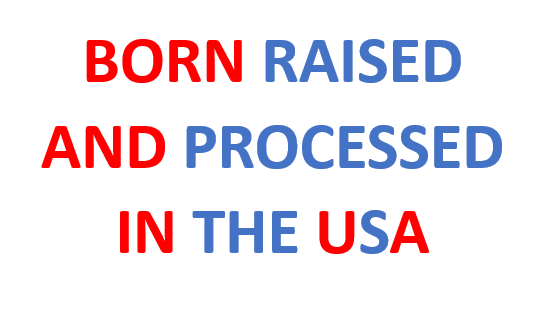January 6, 2020
Cattle producers now have the dubious distinction of being betrayed by the President and both political parties. There was no Country of Origin Labeling (COOL) in the recent vote by the House of Representatives to re-do the NAFTA agreement. This would have been the most logical place to reinstate COOL. Unless the Senate restores COOL when they vote in early 2020, American consumers will continue to be ignorant of the true origin of their beef purchases and cattle producers will continue to have beef and cattle imports killing the market.

The original NAFTA agreement sacrificed two broad segments of Americans – factory workers and cattle producers. We know how that worked out for the factory workers; their jobs were outsourced to Mexico. We also know how NAFTA allows a flood of unpriced “captive supply” cattle and beef from Canada and Mexico, to depress the domestic market.
Many of us were hopeful that President Trump would restore COOL in his effort to reform NAFTA, which he characterized as the worst trade deal ever. Unfortunately, for all of his political bluster and fireworks, the newly renegotiated NAFTA (United States Mexico Canada Agreement – USMCA) is nearly identical to the old NAFTA. This past summer, cattle producers made a heroic effort to appeal directly to the President but with no success. The House Democrats, however, did add some provisions favorable to the labor unions, but again no COOL.
The NAFTA II/USMCA must still be ratified in the Senate, where we have six declared champions (Senators Tester, Rounds, Thune, Klobuchar, Warren, and Booker). We need to encourage these Senators to recruit more of their colleagues. A phone call or email is cheap and does not take much time. Take the time, it may help and can’t hurt.
Predictably the National Cattlemen’s Beef Association (NCBA), the Montana Stockgrowers Association (MSGA), and the Farm Bureau (FB) continue to team up to oppose COOL every chance they have. Even when their own organizational policies, ratified by their own members, clearly support COOL.
This was the case this past spring in the Montana Legislature when MT-COOL bills sponsored by Senator Al Olszewski and Representative Brad Hamlett did not receive traction because of opposition from the MSGA and the Farm Bureau. Mt-COOL was defended by the Montana Cattlemen’s Association (MCA), the Montana Farmers Union, and Northern Plains Resource Council, but these organizations could not overcome the built-in partisanship of the Montana Legislature. There are a number of Montana’s legislators who should be ashamed of themselves.
Jennifer Houston, President of the NCBA, says of the recent House vote, that “Today was a crucial win for all U.S. beef producers and a reassurance that U.S. beef will continue to have duty-free access to Canada and Mexico.” The vote changed nothing in the cross-border cattle trade, so there is nothing for cattle producers to feel grateful for. The NCBA has a long history of accenting only the export side of the balance sheet and completely ignoring imports. But the fact is we import a lot more cattle and beef than we export to Canada and Mexico, and these imports clearly affect the market for the worse.
In 2018 Cattle exports to Canada and Mexico were only 11.9% of imports. The USDA trade figures say that we imported 630,736 head from Canada and 1,218,236 from Mexico, while exports to Canada was 197,831 and only 21,916 to Mexico. As for dressed beef we imported 343,466,000 lbs. more than we exported, the equivalent of another 570,000 head.
The issue of COOL goes beyond the fact that the cattle market is being manipulated and that consumers are being defrauded, it is also about democracy and national sovereignty. When Congress in 2015 folded, following a World Trade Organization (WTO) ruling against COOL, they rescinded COOL only for beef and pork. All other labeling requirements remained in force including poultry, seafood, fruit, vegetables, and clothing. None of these commodities were affected by the WTO ruling and there is no ongoing effort to outlaw labeling for any other imports.
Most countries have labeling requirements, so why was beef and pork imports to the United States singled out. Obviously, there is no principle that the WTO was upholding. That leaves only corruption pure and simple to explain the WTO ruling. And it can only be the money and influence wielded by the packer cartel that prevented the President and the House of Representatives from including COOL in the re-negotiated NAFTA.
Cattle prices are bad. Equity is being drained from cattle producers all across this nation and beginning ranchers are having some tough discussions with their bankers. The future of our rural communities is in jeopardy. Reinstating COOL will not solve everything that is wrong with the cattle market but it sure would be a good start. We need labels that proudly proclaims:

Gilles Stockton
Grass Range, Mt 59032













Keep on hammering away, now in the Senate. Spread the information. Expose USDA, NCBA, Farm Bureau and state affiliates like Kansas Livestock Ass. Who likely “stole” 10 MILLION dollars of the forced Beef Checkoff monies for excessive salaries, rent and support of skewed research. All to keep the Beef Checkoff slush fund rolling into the NCBA etc. Working against USA farmers and ranchers who are producing the Best, most wholesome Beef in the USA. Allowing consumer fraud to be perpetrated by mis-labeling imported meat as a “Product of the USA” Huge profits to global meatpacker corporations who are known to operate in a corrupt manner. Folks, this is a national security and significant economic wrong that will bury RURAL AMERICA and create a loss of USA JOBS and the ability to produce and identify superior USA products. Canada does it…and very well.
Yes.